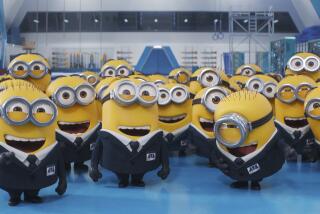PARENTING : Their Action Is the Attraction : * Mighty Morphin Power Rangers may be shallow, but kids love them. Adults are bewildered.
- Share via
In case you’ve been visiting Mars lately, there’s a raging new fad among the elementary school set. It’s the Fox Net work TV show “Mighty Mor phin Power Rangers,” about a group of teen-agers who turn into karate-chopping super-athletes when provoked, then morph into big mechanical monsters (“zords”) to finish off their enemies.
The show spawned a feeding frenzy for Power Rangers dolls that reached a crescendo before Christmas. Stories circulated about parents driving all night and crossing state lines to get the colorful figurines.
Last month a Power Rangers personal appearance at Universal Studios caused a ruckus. Parents and kids clamored to get to the show, turning the Hollywood Freeway into a parking lot extending to downtown. Police finally had to close off freeway exits in an effort to control the record crowds.
What’s going on? What could possibly be so great about Power Rangers?
As the mother of a Power Rangers aficionado, I confess total bewilderment. And I’m not alone.
“I don’t see anything new or unique about the show,” says Gretchen Garrett of Van Nuys, whose son Timmy tries to rearrange family activities around “Power Rangers” episodes. “It’s stylized, like the old Batman TV show. It’s got karate, but so do Ninja Turtles and lots of other shows.”
Unlike some shows, however, “Power Rangers” avoids realistic blood and guts, which pleases Char DeMott of Studio City. “I also like the way each show focuses on a positive theme--say teamwork or tenacity,” she says, “and illustrates it through the plot.”
The characters are so shallow, they’d fit in a petri dish. But who cares? Certainly not kids.
The worst thing you can say about “Power Rangers” is that it’s formulaic. My main complaint is that it has temporarily replaced “Roundhouse” (Nickelodeon’s bright, satirical revue) in my daughter’s affections.
*
Others have more strenuous objections.
A whole school of thought in child psychology says all shows that teach aggression as the solution to problems increase aggression in society at large. But psychologist Kathleen Welch of the Juvenile Offense Program at the San Fernando Valley Child Guidance Clinic disagrees.
“If your child’s already aggressive and acting out, you might want to limit their viewing of TV shows that feature violence,” she says. “But you should also be taking more positive steps. Those kids need to learn more pro-social ways of dealing with anger. Just limiting their exposure to violence isn’t going to teach them new skills.”
Dr. Herbert Blaufarb, who oversees outpatient treatment services at the clinic, agrees. “The real sources of aggression in children are genetic and environmental,” he says. “When I get a child in here who’s acting out aggressively, I look first to the family environment. Next I look at his or her personality since birth. Some people are simply born with more aggressive personalities.”
Viewing habits and exposure to violent movies or TV shows are, in Blaufarb’s opinion, negligible factors in the development of violent habits in children.
“I question how much influence the media have at all, not just negatively but positively,” Blaufarb said. “For instance, the theory that these shows provide ‘super-heroes’ who help kids work out their fantasies of power and relieve feelings of persecution. I don’t think it’s as important as it’s been made out to be.”
*
How does this theory about the media’s impact on psychosocial development hold up against more lurid fare such as “Mortal Kombat” (the graphically violent video game) and “Night Trap” (the computer game so vicious that Toys ‘R’ Us removed it from its shelves)?
“Again,” Blaufarb said, “to parents worried about the effects of these games, I would say, ‘Look at how you’ve reared your child before he or she got to play these games.
“If you haven’t been asleep at the wheel and you’ve set appropriate guidelines for social conduct, you don’t have to be concerned about the child using his aggressive impulses destructively.’ ”
If your child is starting to show aggressive tendencies, Blaufarb advises, “Ask yourself what you can do to help them use those aggressions productively. Aggression isn’t bad per se. Civilized people just use it appropriately.”
Ken Nagayama, owner of a martial arts studio in Burbank, suggests one strategy for handling aggression.
“We’ve had success using karate to lower aggression in angry children,” he said. “We teach control, so that when our students kick they use their anger, but in a controlled fashion.
“The anger is expressed, but no one is hurt.”
More to Read
The complete guide to home viewing
Get Screen Gab for everything about the TV shows and streaming movies everyone’s talking about.
You may occasionally receive promotional content from the Los Angeles Times.






